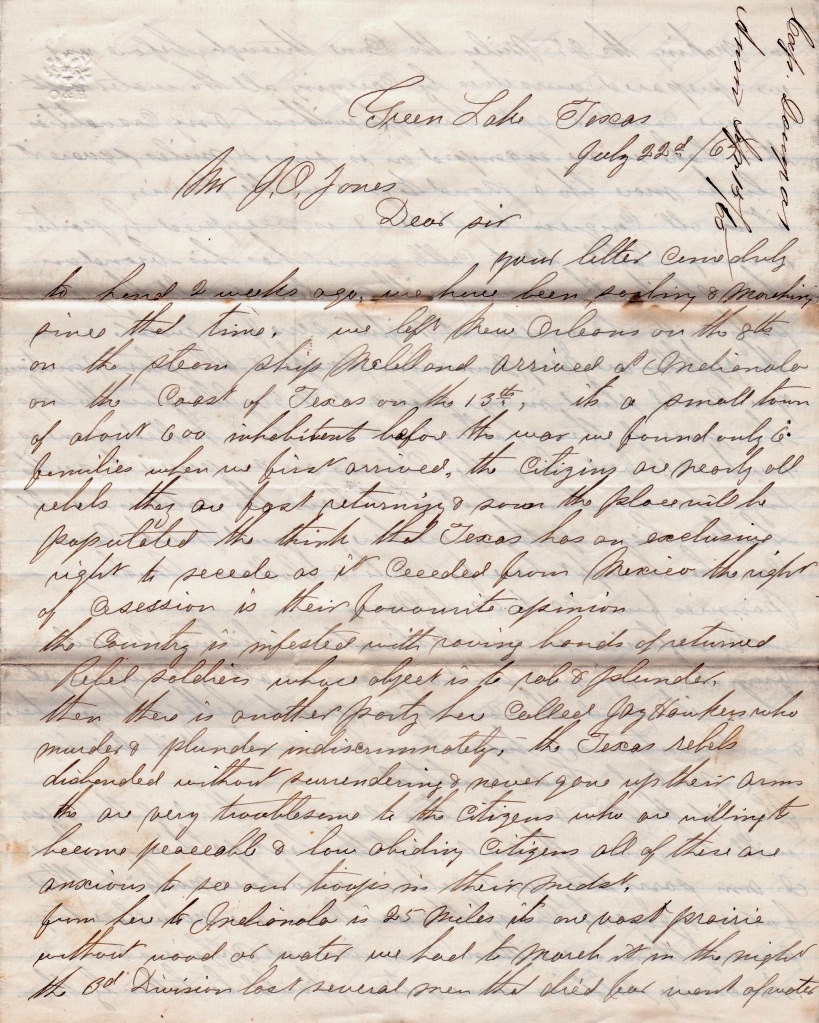
These letters were written by Henry C. Douglas (b. 1836) who enlisted on 5 September 1861 in Co. K (“the Vigo Rangers”), 31st Indiana Infantry. He entered the regiment as a sergeant and was rapidly promoted to First Sergeant. By the time Henry had written the first of these letters he had already been promoted to 1st Lieutenant of his company. They had also passed through the battles of Fort Donelson, Shiloh, and and Stones River. In November 1864, he was promoted to Captain.
Henry wrote the letters to Joseph Olando Jones (1814-1899), the Post Master of Terre Haute, Vigo county, Indiana. Jones was appointed postmaster in 1852. When he supported the Republican party in 1856, Jones was removed from his post and not reappointed until Lincoln took office. Jones first came to Vigo county in 1816 as a toddler with his parents but when he was 14 years old, both of his parents died and he was taken back to New York by an uncle to be educated. He returned in 1835 and remained in Vigo county for more than 50 years.
[Note: These letters are from the collection of Jim Doncaster and are published by express consent.]
Letter 1
Headquarters 31st [Indiana Infantry]
Cripple Creek, Tennessee
April 15th [1863]
Mr. Jones, Sir—
I feel under many obligations to you for your kindness and deep interest in my welfare. I received your letter some time ago—also the proceedings of the Union Convention 1 and Dr. Read’s speech—which is a very eloquent speech. I am glad to see the masses of loyal people responding so nobly to the Union cause and striking terror to the butternuts that is not worthy the name of Americans and should not have an inheritance among the loyal citizens and I will here state that it is a determination by all the soldiers in this Western Army that if they are ever called on to put down home butternuts, they will be annihilated from the face of the earth. Their hearthstones would be left desolate. I do not say this from boast. It is an every day talk among the men and swearing eternal vengeance on traitors at home.
I sent H. D. Scott a rebel envelope. I got it from a lady living at our picket line. She professes to be Union. It is a motto of Southern respect for our time honored flag.
I suppose you seen an account in the paper of the little brush we had with the rebels on the 2nd of this month at Woodley 12 miles from camp. Company K was engaged in it as flankers to the skirmishing. Our company marched through the rebel camp. Their fires were burning and meat and meal was strewn over the ground and some 25 or 30 guns I piled on the fires. One double barreled shot gun I carried to camp with me. We marched some 32 miles—somewhat tired you may judge when we returned to camp but no one hurt in the 31st [Indiana].
The army never was in as good health as at present and in good spirits. Your voices raising at home to sustain the army has animated ever soldier.
Capt. [James R.] Hallowell brought us a stand of colors. We feel proud of them—a beautiful emblem from our state and our noble governor who has the heartfelt thanks of every Indiana soldier for his untiring devotion to the Union cause and the welfare of his brave boys.
I will be glad to hear from you at your earliest convenience. Give my respects to the firm and enquiring friends. Yours truly, — H. C. Douglas
to Mr. J. O. Jones, P. M.
1 Probably a reference to the Union Mass Convention held in Indianapolis on 26 February 1863. Some 30,000 people attended. Resolutions were passed reaffirming devotion to the Federal Union and a hearty support to the Government in a “vigorous prosecution of the war until the rebellion is crushed out.”

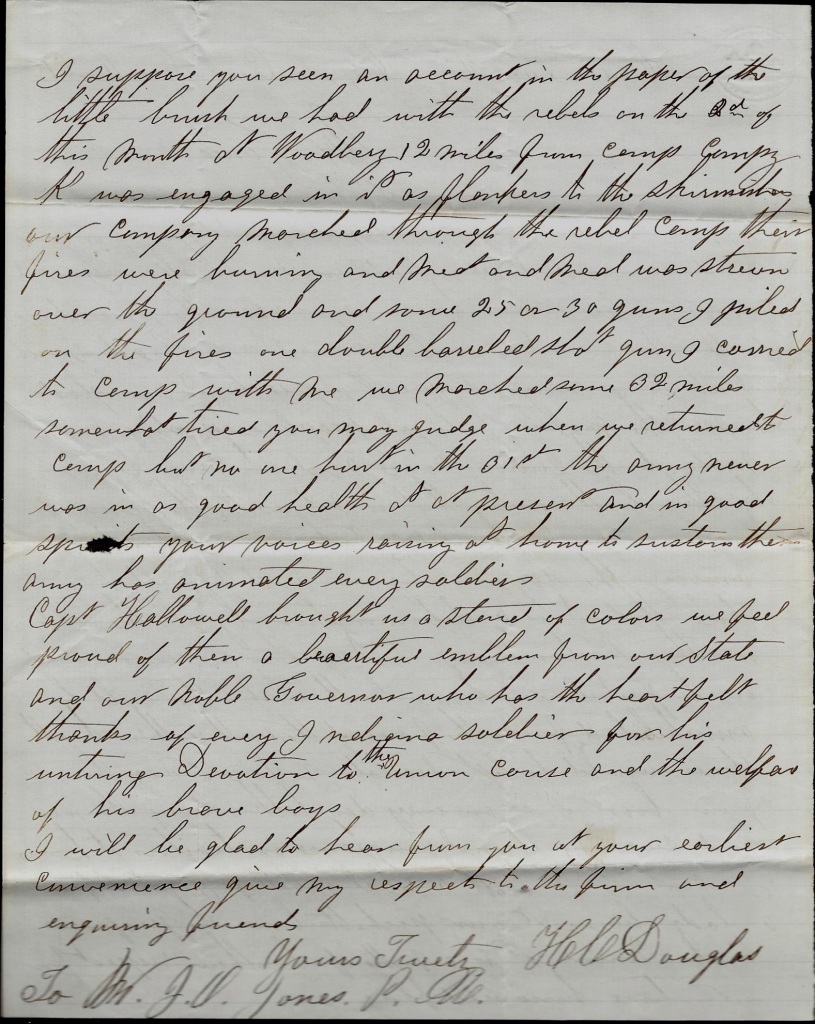
Letter 2
Chattanooga [Tennessee]
October 5, 1863
Mr. Jones, Sir—
I will beg a favor of you to get me some paper—half ream of best quality about this size, also half ream of both post, a little smaller than this sheet. I sent to Mr. [David] Hartsock for some but he sent me the commercial note which was no use to me. We have so much writing to do in making reports—monthly, semi-monthly, and quarterly returns of clothing and ordnance stores, [and] inspection reports, that it keeps us a large portion of our time writing and we cannot get any good paper and I thought you would be the most likely person to send to. And if not too much trouble, I would like to have a small case of good drawing instruments—particularly the pens and compasses and a bottle of the best quality of red ink Carmine. These articles we need every day and if you will be so kind to get them for me and send by someone coming to the regiment when there is an opportunity, and I will send you the money or an order for it.
The army is in good spirits. We are looking for an attack every day. It is very mortifying to the men and officers to see the reports of some of the reporter correspondents in the papers such as the New York Herald and some others. [Charles G.] Shanks, the correspondent for the Herald, if our men get a hold of him, they will hang him, the lying pup. He reported that our Division broke in disorder. Palmer was complimented and the officers and men of his division for the noble manner we sustained ourselves and when we were ordered from our works we thought it was for a bayonet charge and every man was prompt to duty and action. And there never was men fought with more perseverance and endurance and we kept our front clear of rebs all the time.
They made two attacks on our division which lasted 1 hour and fifteen minutes each attack. The rebs were slaughtered down like sheep and we felt perfectly safe in holding our ground. The men is highly complimented by every officer in the division for their courage and bravery and the surgeons told me that they begged some of the men they took back wounded to stay and help them to take care of the wounded and they would not do it but rushed back to the scene of action. And the surgeons all say they had not half enough of help.
On Saturday night of the 19th, we made breastworks of logs and rails and such as we could get. On Sunday morning we were attacked at 8:40. Our men fired 120 rounds to the man before casing. We tore our shirt tales and the lining out of coats to clean the guns and all the officers cleaned guns and load for the men to increase speed and keep guns from choking. Nearly all the men in my company tore off their shirt tails and was cheering all the time. I never seen men in better spirits and shot with cool, deliberate aim.
I seen a rebel paper of the 1st stating that they had taken 2500 of their own wounded off the field that was able to be moved and more than that number is left unable to be moved so their loss must have been very heavy.
Our men suffer now for want of blankets and socks, The nights are very cold here and many of the men sit up all night by a fire. When we fell back to Chattanooga, we made fortifications sufficient in 2 hours to stand a month’s siege. Rosecrans said it beat anything he ever seen. Every company made their own fortifications. Our works in 2 hours was 4 feet high and 4 feet thick. Now they are from 12 to 20 feet thick.
Deserters that come in last night says that Bragg is going to open on us this morning. It is now 8 o’clock and no attack yet. He will meet with a warm reception. There is not a tree to stop a bullet for half a mile in our front but what we have cut down and used them in our fortifications. I hope Bragg will not disappoint us in making the attack.
I received your letter and read it to my company with much interest. We exchange papers with the rebels every day on picket. The pickets are close to each other. I don’t like to hear them so close to us. They are not friendly visitors and I am in favor of driving them off. They are intruders.
It is the sentiment of this army that at least 50,000 fresh troops should have been pushed into the western department long ago to protect our rear and keep Kentucky & Tennessee clear. Too much trifling with the draft. There never was a time in this war that more energy should be used to put troops in the field than at this time. The lives of our veterans are precious and if we had have 25 or 30,000 additional troops, we might have been in Atlanta now and whipping them up. We would almost be able to form our lines with the Potomac.
Many prayers ascended to high heaven from this army for reinforcements. 42,000 was struggling against 104,000 of the flower of the rebel force besides 15,000 Georgia militia making 119, 000 we contended with three days. Our cause is just and conquer we must, and God is watching over His people. Some cannonading are going on at this time. I will close and hope to hear from you again.
Yours with respect, — H. C. Douglas
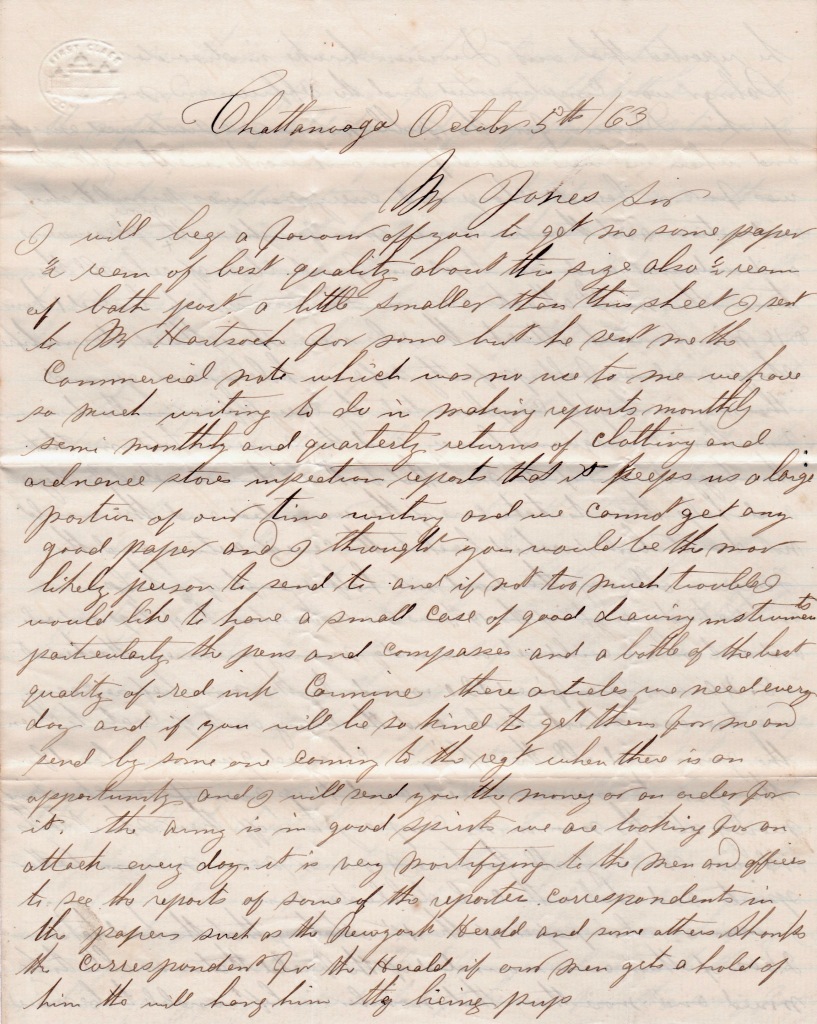
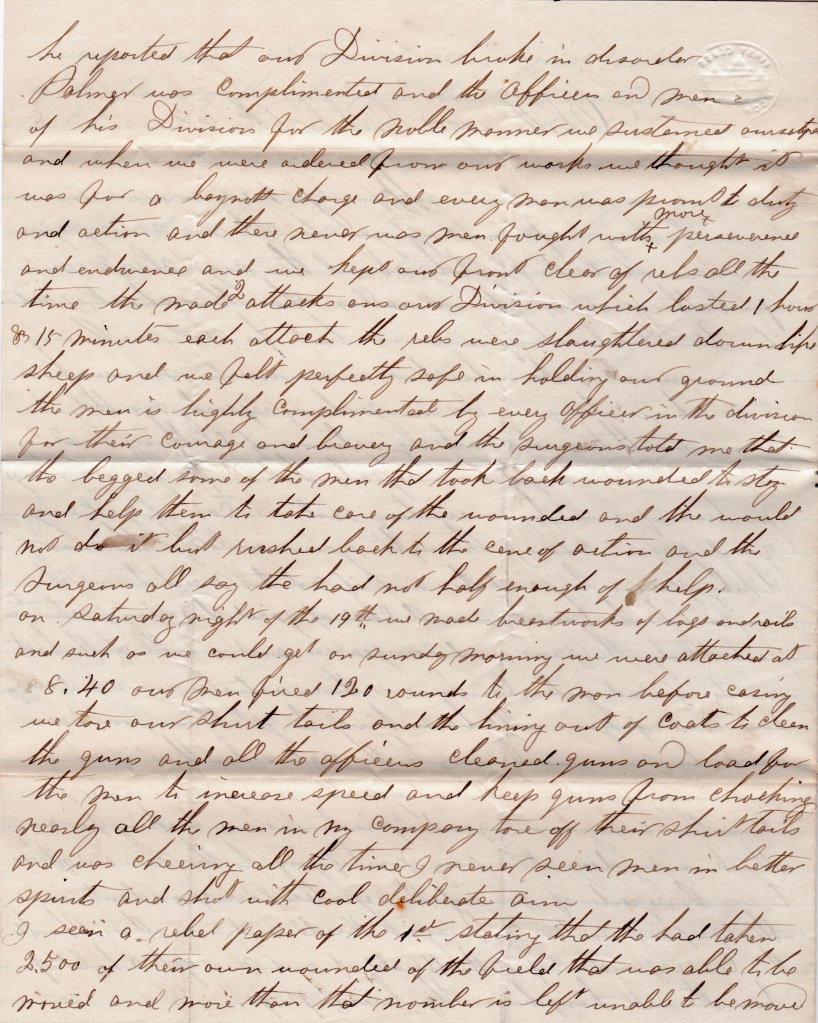

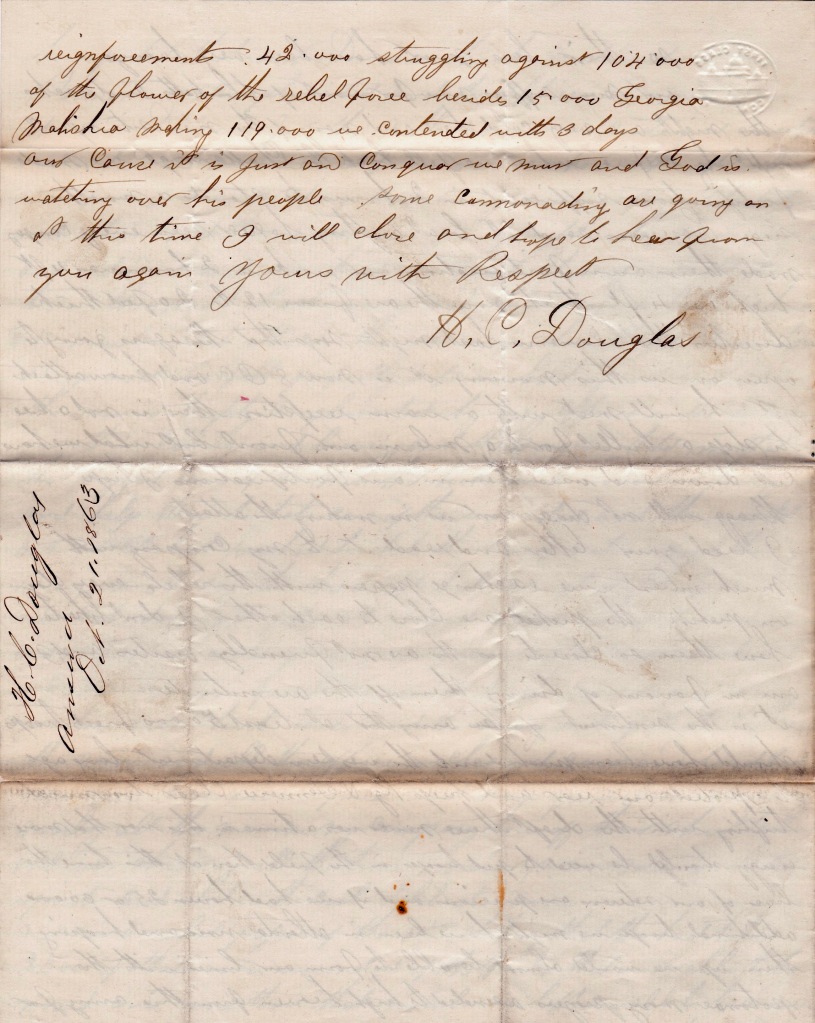
Letter 3
Bridgeport, Alabama
November 16th 1863
Friend Jones,
Yours was received with a box of instruments and all in good order. I am well pleased with your selection and under many obligations to you. Capt. [George L.] Hager has gone home with several officers from the 31st [Indiana] to recruit and he will give you all the news and the particulars relating to the army. It is very encouraging to us the victory you have gained in the elections. The army feels in high spirits from the results and it will strengthen the army by many of the old veterans reenlisting when their time of service expires and I think three-fourths of them will be in the army in 2 months after their present service expires. We understand an effort is a making to have the soldiers allowed their furlough time. If so, it would have a good effect and induce thousands to reenlist.
There is a large portion of married men in the army and gallant soldiers that was promised furloughs once a year and I think it has been injustice to them not giving them a furlough once in 3 years. Many left their families and business very much unsettled. Young single men it matters not, and it has been quite a grievance in the army for a long time—married men being deprived of the right that was promised them at their entering the service. I do not speak of it as a fault of the government. It is not, but rests with the generals commanding, and I for one among thousands of others wish it was counseled with the Governors of the different states that married men leaving their homes & families should be allowed 20 or 25 days in the year and not injure the service in the least. The war is not likely to end at expiration of the term of service. A large portion of this army’s times out and the government is giving an inducement in the way of bounty. [But] the men—particularly married men—will not recognize the inducement and all says that home is of more importance to them. Their true patriotism has not been valued enough. When the officers of the different companies presented the order to raise veteran volunteers, they would scarcely listen to it read. It reads thus: if the exigency of the service would permit, they’d be observed. That, the service would never permit. They want it to read, will have a furlough. I am for the interest of my country and present these grievances that might be rendered without injuring the service. I will soon be 3 years in the service without visiting home. I do not complain as I am single.
The army is very healthy and in good spirits. We expect that Burnside will have a battle before long and the result of a victory would effect a good deal at that point. There is great strategic movements on the part of the rebels. The loss of East Tennessee is a serious loss to them but they will have to suffer a greater loss ere long. A house built upon sand cannot stand right. In might and unity is strength and will prevail.
I will send you an order on Hartsock & Bannister [Merchant tailors in Terre Hate] for the amount. We deeply regret the loss of General Rosecrans & General Crittenden. The foul tongue of slander has made its impression. They have won the esteem and confidence of the army. They are both perfect gentlemen, true patriots, and gallant soldiers, and hope they will be rewarded for their arduous labors and true devotion to their country.
My respects to your family and hopes you are all quite well. Write at your earliest convenience and I will be glad to hear from you with many thanks for your kindness. I remain yours truly, — H. C. Douglas
to J. O. Jones, P. M.


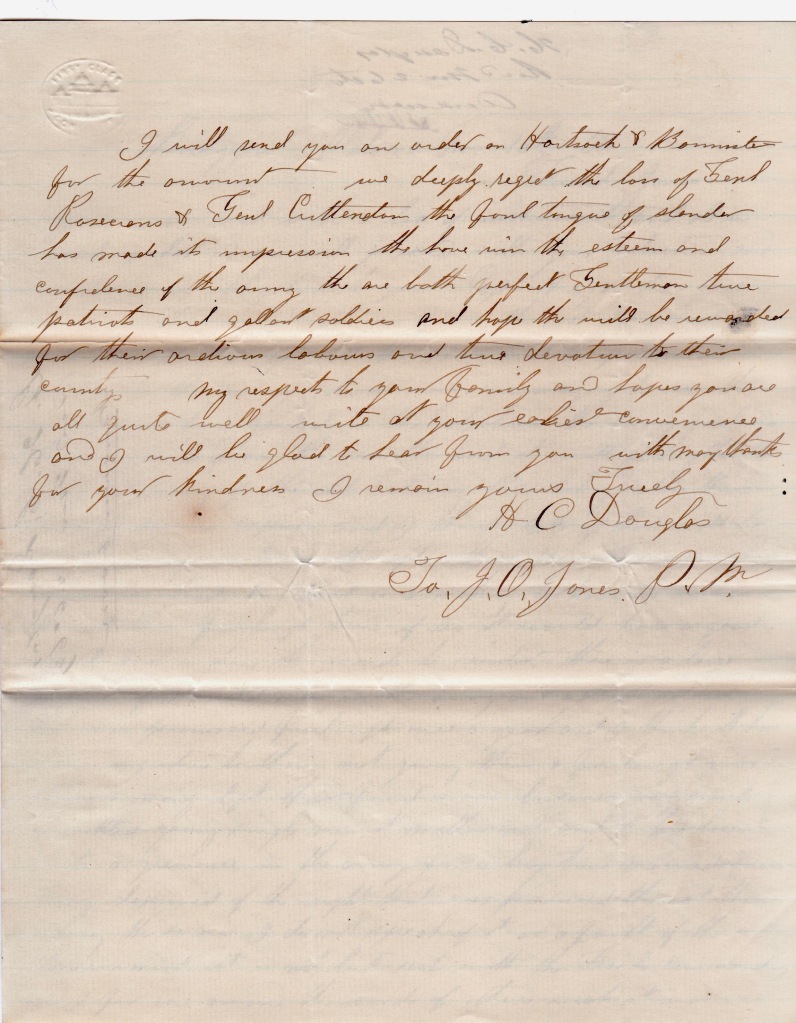

Letter 4
Bridgeport, Alabama
Friday, January 8th 1864
Friend Jones, Sir—
The 31st [Indiana] Regiment has gone into the veteran service and we expect the men will get paid today. We are expecting to start for home on Monday or Tuesday at farthest.
You will please notify others and also to have the farmers bring in the chickens to save sending out a foraging party.
Yours very respectfully, — H. C. Douglas
To J. O. Jones, P. M.
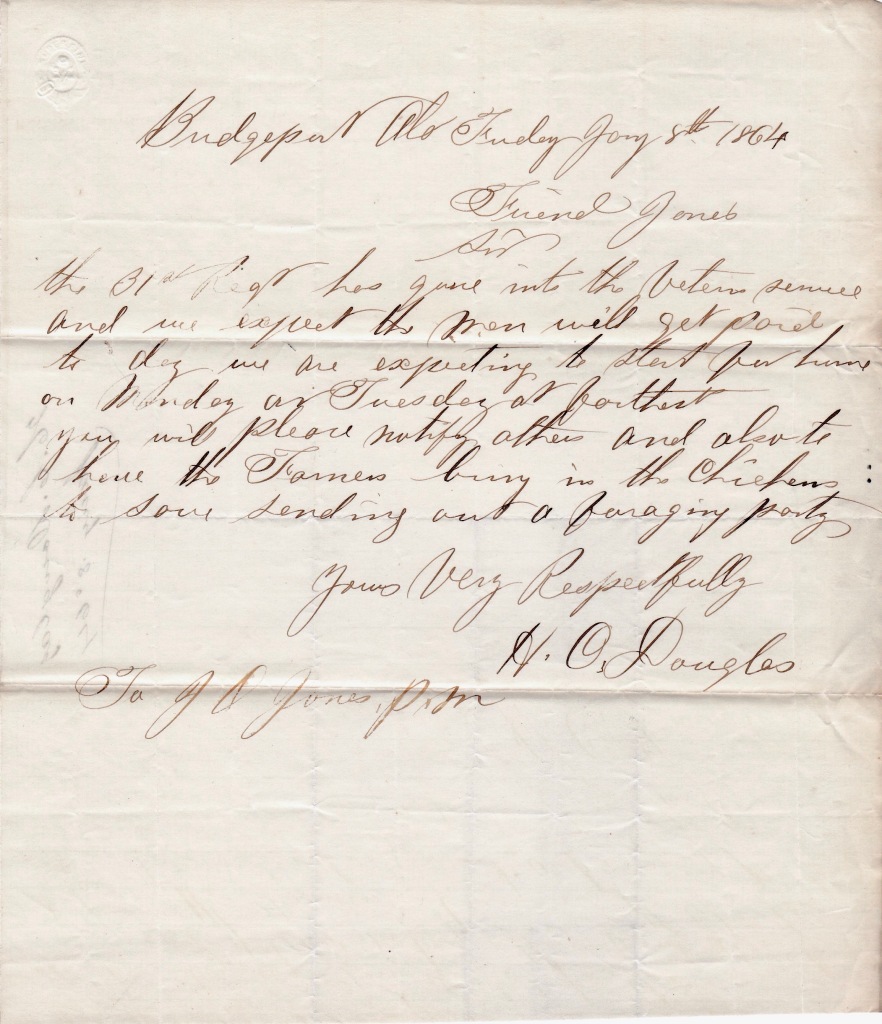
Letter 5
Pulaski, Tennessee
November 22nd 1864
Mr. J. O. Jones
Dear Sir—
I acknowledge the receipt of your letter received yesterday. I have not time to answer at present but will in a few days. Captain Brown of the 31st [Indiana] is going home & I write a few hasty lines to send to you by him. Many thanks to you for the numerous papers you sent me. They were hailed with delight. I received several parcels of papers from you while on the move. I circulated them throughout the regiment together with McClellan’s military career. I will write to you more at length & give you all the particulars in a few days. It is so cold I can scarcely hold the pen.
There is a probability of us moving tomorrow. I have been busy for the past week night and day making out pay rolls for my company. They have never got paid. I will enclose a receipt of the amount paid the commissary of subsistence for Capt. Samuel C. Scott & you will confer a favor on my by presenting it to him & collecting it & pay Hartsock & Bannister 50 dollars for me and send twenty dollars to my brother in Indianapolis for me. His whole bill amounts to 127 dollars. The balance you will retain in your hands until further orders, I want to send some money to my sister but I will wait until I hear from her of which I will let you know & give you her address, You will please give Capt. Scott the receipt signed by Capt. Crow, the commissary of subsistence on payment of the same to you. You will please receipt to him for me and oblige yours.
We are much delighted with the way the election has went. It’s a great victory & will be the means of a speedy termination of the rebellion. I will write to you in a few days. Send me a dollar’s worth of stamps and oblige yours truly, — H. C. Douglas
If he is not ready to pay it, have him sign this.
Headquarters 1st Brigade, 1st Division, 4th Army Corps
November 21, 1864
Received of Lt. Douglas one hundred and eighteen dollars and 47/100 in favor of Capt. Scott being the amount in full of all accounts against Capt. Scott.
— George R. Crow, Capt. and A. C. S.
Pulaski, Tennessee
November 22, 1864
For value received I promise to pay Henry C. Douglas or bearer the sum of one hundred and twenty-seven dollars to be paid when called for.



Letter 6
[Note this letter was part of the original collection but was sold before a full transcript could be recorded for inclusion with Henry’s other letters. I cannot vouch for the accuracy of this transcript (which was posted by the owner at the time of sale) but believe it to be substantially correct.]
[Nashville, Tennessee]
December 11, 1864
Mr. J. O. Jones, Sir,
[First page not transcribed]
Well, a word about the Battle [of Franklin]. The Rebels pressed us tolerable close from Columbia to Franklin. We marched all night and got into Franklin at 9:30 o’clock a.m. of the 30th. All hands were very busy throwing up fortificaions and had made tolerable good works by 4 p.m. when they made the attack. They supposed that a large portion of ours had crossed Harpeth River but in that they were very much mistaken. Where they charged our works the heaviest was on our line where the Columbia Pike come in and where our best works were and there was not as much as a stick for 300 yards to stop a bullet. The slaughter was the most terrible of the war. The ground was covered with their dead and at one time they got over our works, & by a bayonet charge of fresh troops, we took most of what got over prisoners & what was not prisoners was either killed or wounded. Dead men and horses were laying thick on top of our fortifications but in the darkness of the night, we lost many of the prisoners.
They made 18 successive charges lasting from 4 until 10 at night. The rebels seemed to be desperate and determined and our men fought with courage never before surpassed. It was not a battle of ordinary character. Each man took deadly aim & held fire until they got within 150 yards. Cheers rent the air as their shattered ranks had to fall back. I have never known the Rebels to make such mad and desperate charges before and we never had as good a chance to mow them down. I could count their line of battle in the front rank as they come up on the charge. They were whipped in every engagement we had with them since we left Pulaski & it seemed to be more their object to flank round and get between us and Nashville than to fight us except at Franklin. And as we had but a Corp and a half, they thought to make a good thing of us.
I talked with a prisoner that was taken since we reached Nashville. He said he helped to bury the dead of both theirs and our own and he said they had about twenty to one. Our dead had to be left but there was but few killed & the most of our wounded was sent back to Nashville. The only wounded they got was those on the skirmish line at 11 o’clock at night. We quietly left and marched 18 miles by 7 in the morning. It has been the hardest time this army has ever seen since we left Pulaski, marching day and night [in] mud, rain and cold. It is freezing now as hard as I ever seen in Indiana and the men is not prepared for it. They have no comfortable quarters up. The tents we have is but little better than out of doors. I am so cold now that I can scarcely write although I have a small stove and fixed it up.
I feel thankful for the stamps you sent me. Just take pay yourself for what stamp you have sent me from time to time & I feel under many obligations to you for the many parcels of papers you sent. They were hailed with delight. You will excuse my not having time to acknowledge the receipt of them when received. I will enclose a note to Capt. Hager in our letter. Give my respects to the firm. Capt. Hager and Capt. Seatt will be glad to hea from you at earliest convenience.
With many thanks for favors, I remain yours truly, — H. C. Douglas
Letter 7
Nashville, Tennessee
December 15, 1864
Mr. Jones, sir—
I received a letter from y sister & I promised to send her some money. You will please send her 20 dollars as soon as Capt. Scott pays you. Direct to her as follows.
Miss Mary Douglas, Springfield, Ohio
I am sorry I have to trouble you so much but I have no other to so such business for me.
Everything seems quiet on the line today. We are packed up ready to move. An advance on the enemy is anticipated as we cannot move any great distance with the condition of the roads. Would like to hear very much from Sherman & would like to be with him. I expect he has reached the coast before this.
Write when convenient. Yours truly, — H. C. Douglas

Letter 8
Columbia, Tennessee
December 20, 1864
Mr. Jones,
Our victory is complete. We have captured at least 50 pieces of artillery & it is reported 102 but we have all their artillery but three effective pieces what they have got besides three is dismounted and are hauling it on wagons. Their wounded together with our own fell into our hands at Franklin—that is, what they got of our wounded at the Battle of Franklin. They run back through Franklin with hats off & barefooted, thrown guns & everything they had and our brave boys after them cheering. We got 3100 hundred of their wounded at Franklin. Their army is completely demoralized & fleeing from the [ ] to come. It was all we could do to keep our boys from killing the rebels after they surrendered as they fired on us until we reached their works & then threw down their arms & our boys were mad.
Our regiment lost 43 in killed and wounded. Corporal [William W.] Fox & James Godfrey of my company is killed in the charge. Jacob W. Hoops & George Lamb is seriously wounded also of my company. My drafted men done splendid & any man that says mays my drafted men don’t fight can have a fight out of me. The 31st [Indiana] is covered with glory & General [Nathan] Kimball led the charge with hat in one hand & sword in the other. Our men worship him. He should be a Major General. [David S.] Stanley is at home & we do not want to ever see him in command of us again. The troops has no confidence in him and old soldiers knows good generals.
We are now at Columbia & the rebels are completely demoralized. This is the greatest victory we have ever gained. It is now snowing and sleeting & very cold but the boys don’t feel it as they’re after the rebels on the jump. The rebels for a line every few miles to try & check our men but we pay no more attention to their line than it if was schoolboys. We go for them with a yell. It is said we have a force to stop their crossing the Tennessee river. If so, we will destroy the whole rebel army.
Since I commenced writing this, we captured 4 pieces more of artillery and our cavalry are bringing them in by the hundreds—the prisoners.
William W. Fox and James Godfrey was two of my best soldiers. I mourn their loss. Hoop & Lamb is seriously wounded & I fear mortally. I never seen the men so anxious to fight. The citizens of Nashville followed us on the 1st two-days fight & picked up the dead & wounded. They did not lay on the ground ten minutes. The women followed us and showed great courage & cheered us in the charge. We have now gone 42 miles almost on the double quick & mud to the knees mixed with snow. Now is the time for the sanitary to do something if they ever done anything. Victory has crowned our efforts. God bless the Army. More anon. Yours in haste,
— H. C. Douglas
Our chaplain was in the front line in the charge. One of the boys looked at him & said, “Hell, a chaplain in a charge.”
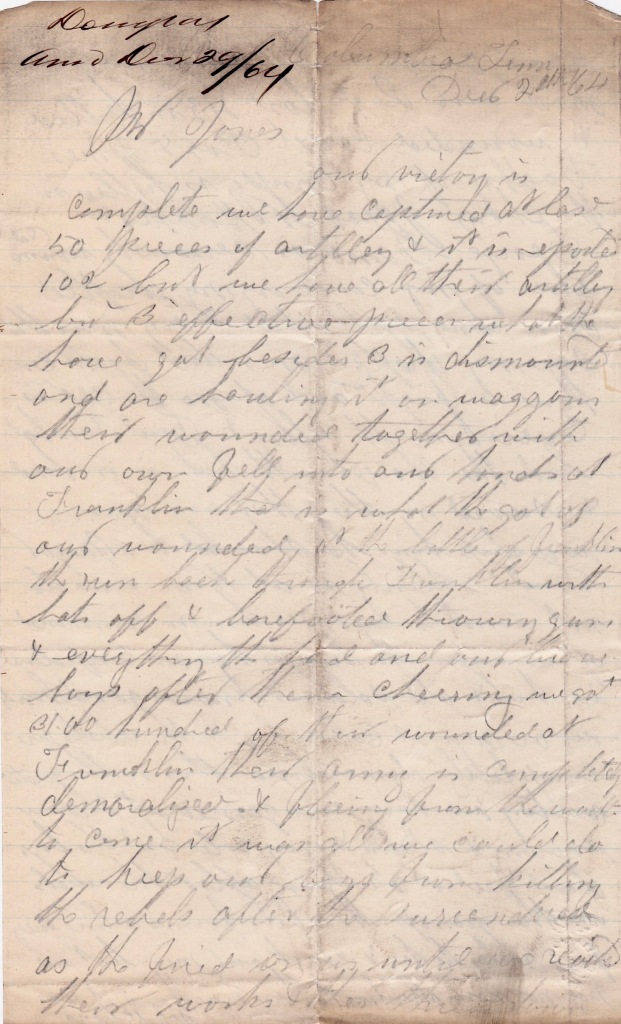
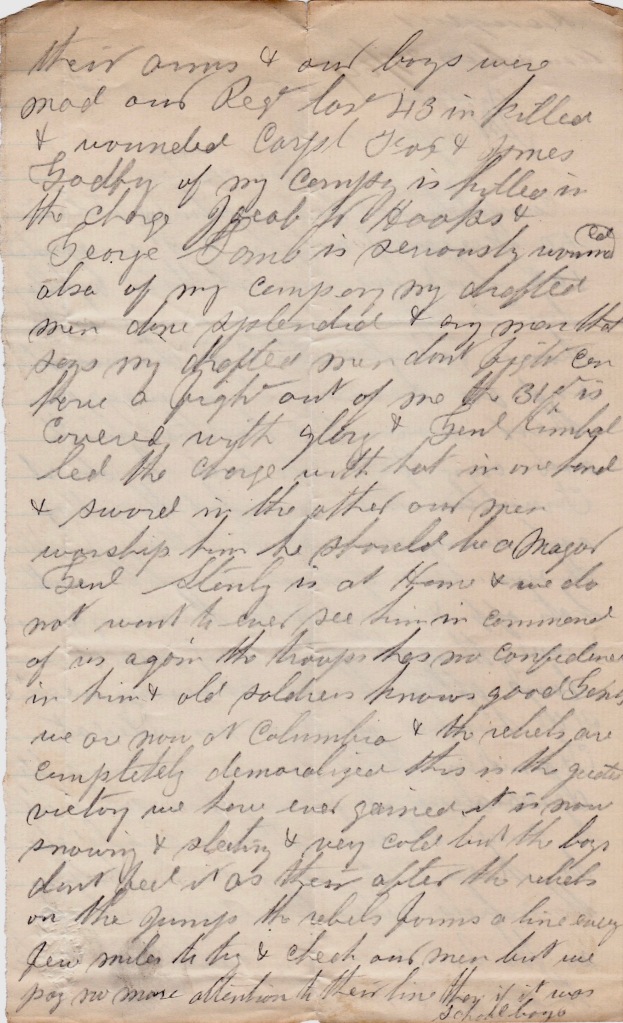


Letter 9
In the Field
South of Columbia, [Tennessee]
December 23rd 1864
Mr. Jones,
We are still pursuing the rebels & we get a shot at them once in a while. We will reach Pulaski by tomorrow or next day.
Since I penciled the first note I had no chance to send out mail nor we received none. I send in this $50 dollars to Mrs. Hoops, her son in my company, Jacob Hoops was seriously wounded. I have not heard from him since the first day’s battle. He is a brave & gallant soldier. I hope his wound will not prove fatal. The money will be of service to his mother & sister. Her name is Catharine Hoops. She lives about two and a half miles west of Terre Haute on the Paris road. You will oblige a soldier by giving the money to her. My sister has sent to me for money & as I have not cash to spare to send her, I am anxious Mr. Scott & Hager would pay you that you might send her 20 dollars. I have her to care for & if they don’t pay you soon, I must send her some of what I have. I paid these to oblige expecting it to be forth coming to me to meet the demand required of me.
The weather is extremely cold. It is very hard on the men camping in so cold weather but as victory has been the result of our efforts, we can endure much more. Our tents is a mere screen for the winter. It is freezing hard at this time. Quite a number of the men are taking sick. I sent two to the hospital this morning. Now is the time for the sanitary to make themselves useful. I would like to hear from you at your earliest convenience & when Capt. Hager pays you, you will please pay it to Hartsock & Bannister in addition to what I stated before as I need clothes very much and have sent to him for them.
I will write you a long letter and give you all the particulars. Excuse haste. Yours truly, — H. C. Douglas

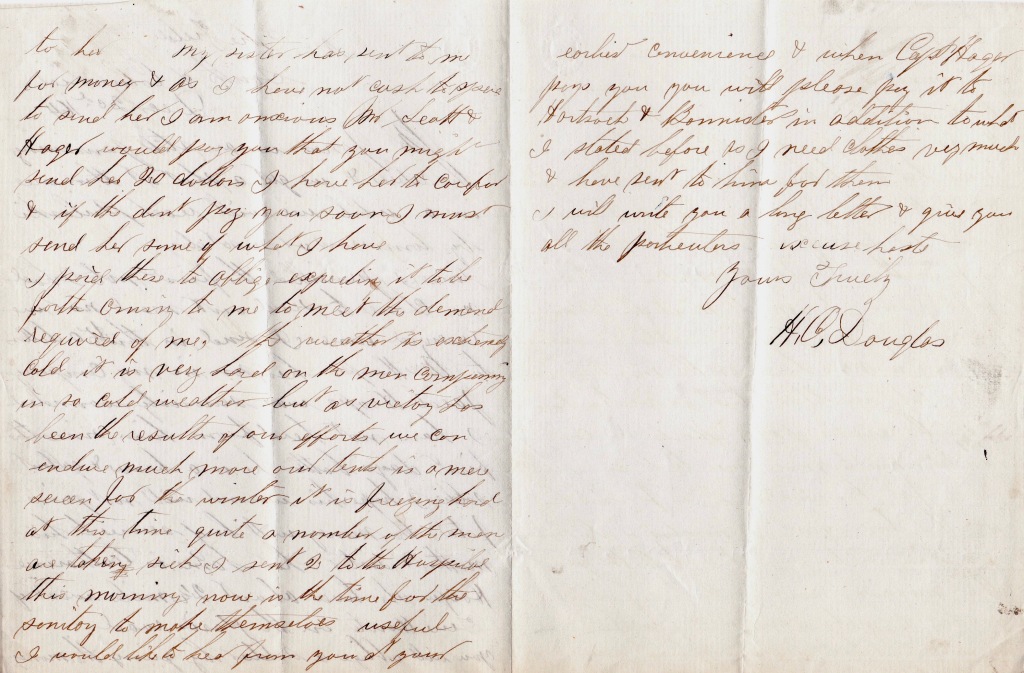
Letter 10
Elk River, 12 miles from Athens
January 2d 1864 [1865]
Mr. J. O. Jones, Sir—
Since my last we have been marching through Alabama. Our destination, I suppose, is Huntsville. The 2nd Division of our Corps has gone to Decatur, Alabama. We are delayed here crossing the river as we have to bridge it. It it is now nearly a hundred yards wide. The pursuit of Hood & his scattered forces is no longer kept up as he has got across the Tennessee & the roads are too bad to follow farther successfully.
I suppose you have received the full particulars of the battle through the public press. It is very mortifying to us to have troops getting credit of another command for what we have done. Some army or newspaper correspondent had an article in the Cincinnati Gazette that the 2nd Division charged and took the works on the first days battle which was a base falsehood. The 1st Brigade of the 1st Division charged & carried the works led by General [Thomas J.] Wood & General [Nathan] Kimball. The other two brigades of our division—the 2nd & 3rd—was laying back in reserve & did not come up until after we had the works & I don’t think they lost man. One hundred and eighty was the loss in the 1st Division & the 3rd lost 43 of the number. The lines were wavering on both right and left of our brigade when we charged. Our regiment was not ordered forward at first as we were supporting two batteries but when the lines began to waver right & left, and a large space vacant in the center of our brigade, it was then the 31st [Indiana] was ordered forward led by the two generals named.
We went with a yell & passed the wavering lines & it renewed their courage & they boldly pushed forward. It was when we passed the wavering columns that we suffered the heaviest as our regiment drawed the attention of the enemy & they poured in a deadly fire. But not a man faltered. Gen. [George H.] Thomas with his staff stood upon the hill that we had left supporting the batteries. He said three times I believe the 1st Brigade will take the works. He immediately turned to his staff and said they have the works & that it was done handsomely.
Merit to whom merit belongs. On the second day’s battle, we do not claim the taking of any of the enemy’s works but we do claim the success of the first day’s battle due to the 1st Brigade & we took every piece of artillery they had in position but one. They dragged it about 200 yards & we captured it but all the rest had not been removed & we turned their own artillery on them as they were running.
When Gen. Wood ordered our regiment forward, he was at the right of the regiment & the command was not given generally along the regiment, but when the right of the regiment was seen moving, all followed suit. Our brigade commander did not know that such an order was given nor our Colonel as our regiment is nearly as large as half of the brigade now, receiving 308 recruits. The brigade commander [Col. Isaac M. Kirby] called at us to halt & stop that damned fool regiment or they would all get killed & told our men to shoot that fool on horseback at the head of our regiment—he not knowing that it was General Wood commanding our Corps. But all the Colonel and Brigade Commander could do could not stop the regiment. It was well they did not as we would have been cut to pieces.
About the time we got half way to the rebel works, they found out the object and seen Kimball and Wood waving their hats & sword saying every step, “God bless you boys, push forward & victory is ours!” It was dusk when the regiments of the brigade got formed in line again in the enemy’s works which ended the first day’s battle.
On the 2nd day, we were on the reserve line supporting Gen. [William] Grose’s Brigade. About 2 P. M., General [Samuel] Beatty with two brigades of negroes charged the rebels on our left & was repulsed but before the rebels had time to reinforce any other point in their line, the 2nd & 3rd Brigades of our Division charged & carried the rebel works that they had thrown up the night previous. The rebels left their corn meal & bread strewn all over the ground & their meat raw & some a boiling—also calves, sheep, & cattle, some alive and some dead, together with all their camp & garrison equipage, axes, spades, picks, knives, forks, spoons, hats, caps, & haversacks. The rout became general & we pursued them 6 miles the same evening capturing artillery every few miles—all the artillery that could be seen.
I have not got General [George H.] Thomas’s official report but it is said we captured 64 pieces in the first two days & 15 on the rout making 79. The prisoners condemn Hood & say he was decoyed as well as a pet lamb with a sheaf of oats to Nashville & turned round in 15 days & gave them the worst whipping they ever got. In fact, Hood’s army was badly whipped before it reached Nashville. The prisoners say they got more men killed at the Battle of Franklin in the length of time than they ever had before—4400 killed, and they’re buried in rows in front of our works. We got to pass over the ground passing through Franklin. The sight is terrible. They’re as thick as railroad ties. Hood has charged that army to death.
We are now partially living off the county and foraging has become the order of the day. The rebel citizens are now paying for their inducing Hood to come into Middle Tennessee. I suppose it is very humiliating to the rebels when they looked over at the Celestial City of Nashville & their bright hopes blighted in so short a time. Their bands were playing round their lines—Who’s been here since I’ve been gone. They now consider the paradise lost.
I will finish this letter when we get to Huntsville.
Huntsville, Alabama
January 5th
Since I commenced this letter we marched over 40 miles & half of our army is barefooted. The probability is we will stay here for some time at least until the army gets shod which will take some time. Write as soon as convenient. Give my respects to the firm.
Yours truly, — H. C. Douglas
to Mr. J. O. Jones
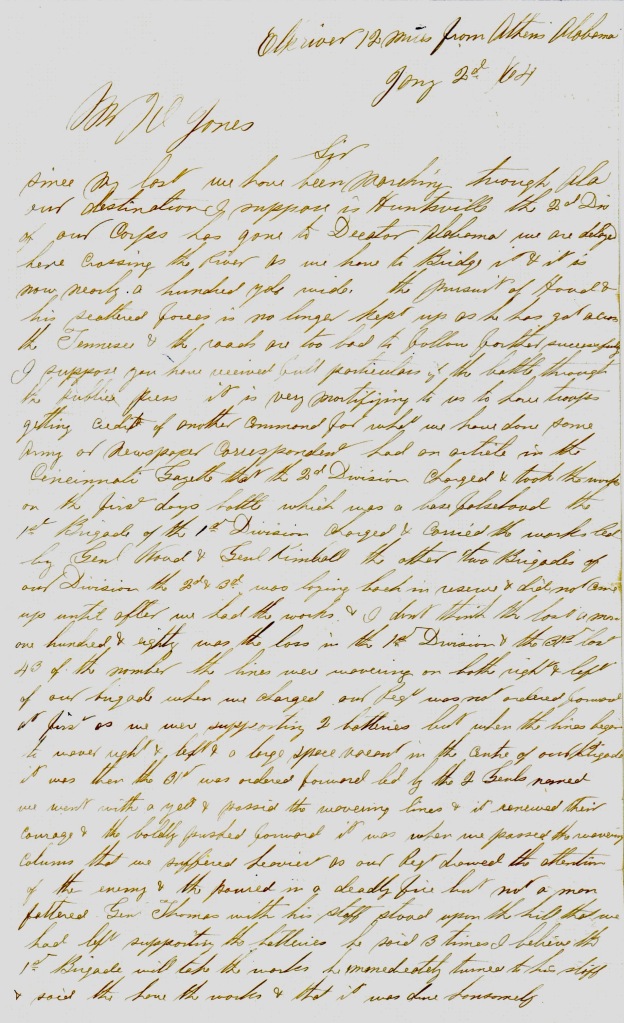


Letter 11
Huntsville, Alabama
January 13th 1865
Mr. J. O. Jones, Dear Sir—
Yours of the 28th & 29th was duly received. We have been very busy since we came here building quarters & chimneys with fireplaces. All vacant houses in and around Huntsville & every board fence for ten miles has been appropriated for soldiers’ quarters. We have now got them completed. This army has never suffered so much hardship & privations before as in the past two months but no one complained as we were crowned with victory.
Sherman is doing the work up for them in excellent style and Burbridge has achieved a great victory in East Tennessee and Western Virginia. Tennessee is now clear of rebels except a few guerrillas. Sherman has now a good base of operations and can supply his army well from water. Just what we needed. We are now cutting off the corners & soon we will centre in on them.
We learn another draft comes off. We are all glad at it. Now is the time to use every energy & drive the rebellion to the wall before it gains anymore life & our drafted men done excellent. The more of them the better. No matter how many butternuts, we soon baptize them in a clear fountain stream that they never backslide from. I gave my lieutenants and non-commissioned officers orders on the morning of the 1st day before charging the enemy’s works to leave any men dead that faltered in the charge so they knew it was certain death behind them & their chances were better in front. Every man mounted the rebel works a cheering. The order had a good effect & I appointed five corporals that was first on the rebel works for their bravery & had the Colonel to confirm the appointments right on the works. It was all we could do to keep the men from lognotting the prisoners as they were maddened to excess.
James Burgen attends to the regimental mail. He is quite well. I told him he must write to his friends. He said he had written a few days previous. I have written to Scott & Hager.
We do not expect to stay here long until we enter on another campaign. Two-thirds of the men was barefooted when we got here. Part has got shoes since but the army is far from being equipped as we have received no clothing for the men yet & a great many are in a very bad condition & cannot campaign until equipped. I had to put 10 of my men which was completely barefooted in the cars at Athens and have them ride through to this place. The ground was froze & could not walk. Two of my men have died since the battle making four out of Co. K. I suffered the heaviest being on the extreme left & exposed to a crossfire from the enemy. Had the 2nd Brigade moved quicker, we would not have been exposed to so much crossfire.
Huntsville has been a very pretty place—the nicest town in the South. About 10 or 12,000 inhabitants in time of peace, but there is many changes in it & the surrounding country—-in fact, all over the country that have no houses southern monuments.
All the officers in Thomas’s command has petitioned Congress to have additional commutation. Everything is so high—nearly triple what it was. I should liked very much to have spent the Holy days at home. We had parched corn & fresh pork for Christmas dinner & fresh pork & parched corn for New Years. The boys thinks the turkeys and chickens are very tough eating this season & very scarce also. However, we flatter ourselves with brighter days a coming. I see from papers that Lee is military dictator & he is sending all the troops to contend against Sherman. I hope Sherman will be kept reinforced sufficient to meet the emegency & Grant pitch into Lee if he weakens his lines any.
I am under many obligations to you for sending me so many papers. It furnishes us with reading matter & we are glad to get the news. I have received all the parcels you sent, I think—several on the campaign. We often get the mail on the battlefield. It puts fresh courage in the troops to know they are cared for at home. Please send me a dollar in stamps & pay yourself. The mail now goes & I must stop. My respects to the firm. Write soon.
Yours truly, — H. C. Douglas
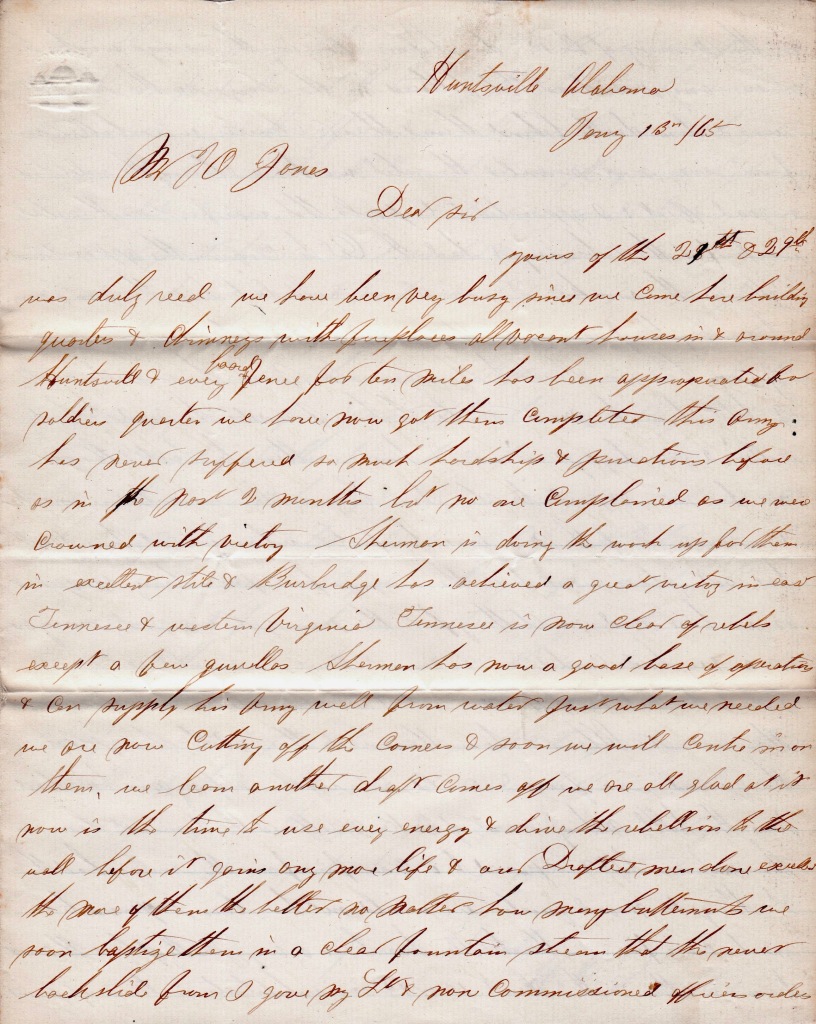


Letter 12
Camp Harker near Nashville, Tennessee
June 15, 1865
Mr. J. O. Jones, dear sir—
Before parting for Texas, I take the opportunity of writing to you. We expected to be home by this time but in this we are disappointed. Them men are very dissatisfied & think they are treated with gross injustice. I will give you their reasons that they set forth. 1st, they came out at the commencement of the war when the bounty was small. 2nd, their families was much less provided for than those that came out later. 3rd, it was a pure spirit of patriotism that brought them out as no draft stared them in the face. 4th, the worst feature is that all offices of trust & acceptable places of employment will be filled by the time they get home. They admit the county will give employment to all & think they can carry the load & [ ] heavy labor as they have born the heaviest of the burden & the heat of the day in this war. The officers whose duty it is lost to complain feels the 4th reason as sensibly as the men but must refrain from expressing themselves as the prevailing excitement is great. The men ask us the question what remuneration are we to receive for additional service after other troops are mustered out. They say they have done their duty as a visit to the battlefields & count the graves of their fellow comrades will give proof they have done their duty.
Another evidence of injustice to the veterans, the drafted men for one years service whose term does not expire for 4 months & over is being mustered out & sent home which is proof to the veteran that we will not be discharged for 4 months at least, and if so, we should claim the preference for over 4 years service. But the men say it is a sweet consolation—the privilege of being a veteran. We are now consolidated into Brigades and Divisions and the officers have more to do at present to quiet the excitement of the men than anytime during the war. Many of the officers are resigning. Seven have resigned in my regiment within the past two weeks in the midst of this excitement which makes it much greater. It’s using a privilege the men are deprived of. I have stood the storm so far & will stand it to the last but it’s the duty of all officers to study the interest of their men. Submission to the powers that be is what we came out to enforce, but the men think it is taken the advantage of the patriotism & spirit for which they enlisted. This grievance extends through the boys which is now veterans. I have been at meetings of the officers where Colonels & Brigade Commanders were present & all think it is an injustice to the private soldier & its making [President] Johnson & E. M. Stanton very unpopular with this part of the army & using the expressions of the men, they would not vote for him for a street cleaner.
The 43rd Indiana is mustered out. They were in the rear all last summer while we were in active campaign & our comrades are lying from Chattanooga to Lovejoy, Georgia, and around Nashville which broke the shell of the rebellion. The question is asked why is the veteran troops in the rear being mustered out? There certainly must be exceptions to the veterans in the front. Gen. Kimball had to visit the 9th Indiana Infantry today and made a speech to them to keep down a revolt. He stated to them that the 3rd Division was in mutiny and he expected to take his division to quell a revolt. The 9th is as brave a regiment as in the service. Sorry that such is the case. Our regiment is submissive to orders but give vent to their sentiments. It is hard to call upon one part of the troops to put down the other who have fought side by side for one common cause, vying with each other in deeds of bravery unsurpassed in the annals of history. The soldiers all feel they have filled their contract for which the war called [them] into the service & when we are again needed or the flag of our country is insulted, we are ready again and again to fly to arms, & if need be, to go through with the same as have already passed through. The men have called upon the officers as their representatives to state the matter to the President but her refers all to Stanton & we might as well apply to the moon.
For my part, if we do not get home in this month, I would rather stay until September. We do not much admire the trip to Texas at this season of the year. All would rather go through with our active campaign when the rebellion was in existence as our chances in battle would be about equal. I hope we will be disappointed in the anticipated [—ualities]. I sincerely hope no act will be committed to blemish the proud name these troops have so faithfully earned. I expect to apply for a position in the regular army myself and hope to have a recommendation from you & other men of influence in Terre Haute through the Governor of the state, but will not apply until my services are no longer required as a volunteer.
Many thanks for the numerous papers you send me. It passes off the monotonous hours of camp life. I herewith send you twelve $12 dollars due to Jenny Fox. Her brother was killed in the Battle of Nashville. She lives at Mr. Coppage’s north of Terre Haute a short distance. I also send forty $40 dollars to the sister and brother of James Godfrey. They are young. George D. Wood is their guardian. They live some 9 miles out on the National Road. You will please give it to them & confer a favor on the orphans. I promised to collect what was due both parties but I made a mistake in the amount due Fox which should have been added to the amount due Godfrey. When I wrote to Godfrey’s sister after the battle, the amount due from various parties it should have been more than I stated & the amount of the mistake was added on to Fox’s. You will please read this & explain it to them as I have lost Godfrey’s address. The amount is more to Godrey than I stated. Less to Fox, but the whole amount is just the same—only small accounts on men that are not with the regiment—some gone to hospitals & some discharged. You will please take their receipts and oblige me as I will have to send the receipts to the War Department.
You will please to favor me with communication & I will give you the news of passing events in the South. With kind regards to the firm, I am very respectfully, yours &c., — H. C. Douglas
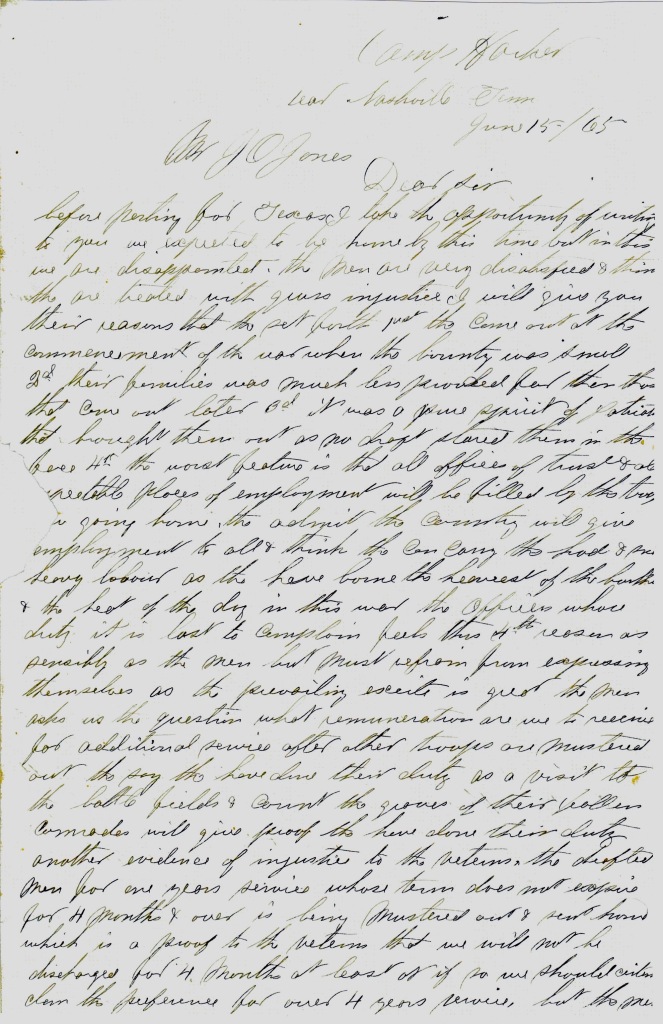
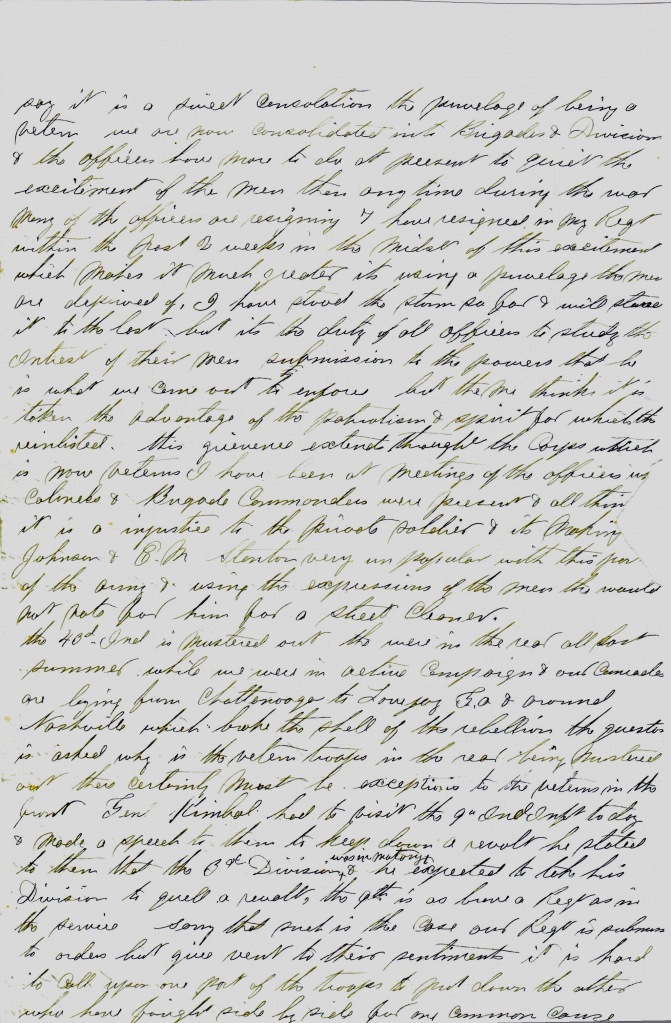

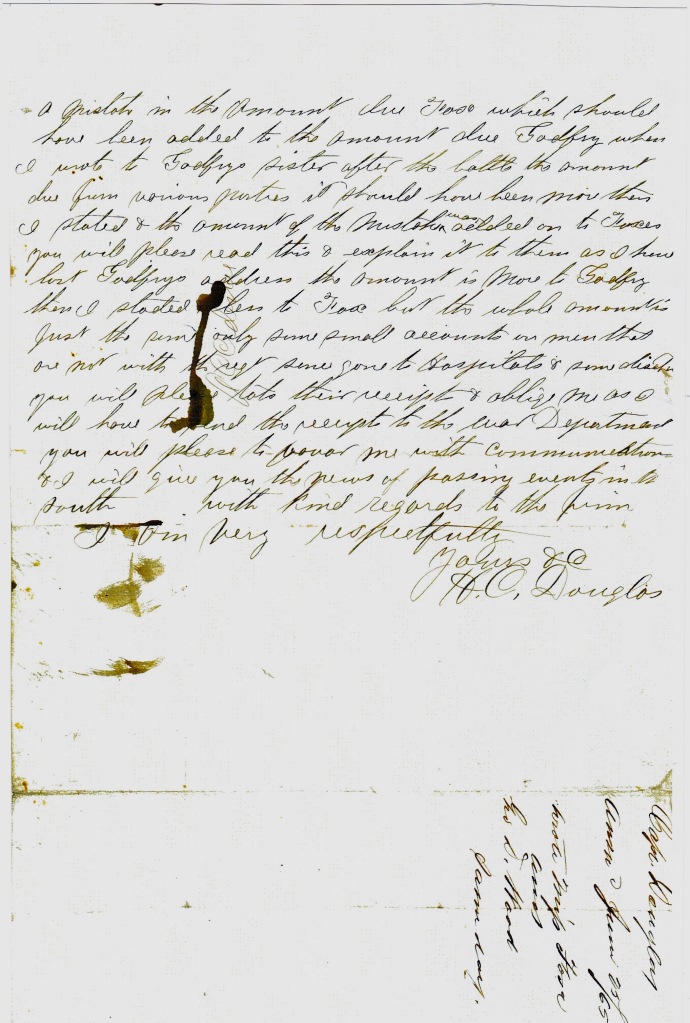
Letter 13
Green Lake, Texas
July 22, 1865
Mr. J. O. Jones, Dear Sir—
Your letter came duly to hand two weeks ago. We have been sailing and marching since that time. We left New Orleans on the 8th on the steamship McClellan. Arrived at Indianola on the coast of Texas on the 13th. It’s a small town of about 600 inhabitants before the war. We found only 6 families when we first arrived. The citizens are nearly all rebels. They are fast returning & soon the place will be populated. They think that Texas has an exclusive right to secede as it seceded from Mexico. The right of secession is heir favorite opinion.
The country is infested with roving bands of returned Rebel soldiers whose object is to rob & plunder. Then there is another party here called jayhawkers who murder & plunder indiscriminately. The Texas rebels disbanded without surrendering & never gave up their arms. They are very troublesome to the citizens who are willing to become peaceable & law abiding citizens. All of these are anxious to see our troops in their midst.
From here to Indianola is 25 miles. It’s one vast prairie without wood or water. We had to march it in the night. The 3rd Division lost several men that died for want of water in making the 25 miles. They came through before us & we prepared ourselves by carrying all the water with us we could & got through without any casualties. This lake we are encamped on is some 4 miles square. It looks more like a pond to me in the prairie. It is all Congress land here & is occupied by parties raising cattle. Each cattle owner has his brand on his stock. They require neither water or salt. The grass is salty & the heavy dews at nights serve for water.
The reptiles are very numerous—snakes and alligators. Sometimes you could stand in one place & kill 50 alligators. The boys has some of them haltered up. We have killed some as much as 16 feet long. The citizens are surprised to see the boys handle them but I believe the soldiers would halter lions if they were here. Good milk cows can be bought here for 6 to 8 dollars & mustang ponies from 30 to 50 dollars.
San Antonio is our destination—distance 125 miles from here. We will start as soon as all our Division gets here. It’s said the country is much better between here and San Antonio. I hope it is for I doubt if this is any part of God’s footstool.
Many of the men are deserting. Soon one third of the Corps will be gone & they are some of the best soldiers we have. I am sorry that good soldiers who have nobly halted for four years to crush this rebellion are now deserting. Some of them were non-commissioned officers and were deserving soldiers. Some action should be taken by the Governors of the various states & the loyal people as nearly all the states are represented in the western army. Aside from the injustices the soldiers think is done him by keeping him in the service, there is another grievance. The generals are aware there is a general dissatisfaction existing throughout the army & they think to put it down by the most despotic means. There is nearly one brigade out of this corps that now in irons—shut up in a bull pen—men who have faced the rebel bullets with undaunted courage. It is heart-rending to the subaltern officers to see these men in irons as a reward for their merit.
The leading generals are trying to make regulars out of this army by enforcing the most rigid discipline. Nearly all the privileges that was granted men when the war was actually in existence is denied them now. The men are required to walk their beat on guard in the scorching sun. Some of them drop at their post sun struck & 30 out of every 90 is put on guard duty & they must not stand in a shade & the subaltern officer who fails to enforce all this is dishonorably dismissed [from] the service & without even a chance of trial. Power is invested in the corps and department commanders to dismiss any officer they may see fit. Some have been dismissed for the slightest offense, not worthy of notice when the rebellion existed—more power than was ever granted to Thomas or Rosecrans or any other department commander. These men who desert—there is no effort made to stop them. They are mustered out dishonorably with loss of all back pay & bounty. And you may judge the matter is becoming somewhat desperate or good soldiers would not desert here in Texas for it is quite an undertaking to go home from here.
It is reasonable to any rational men that a volunteer army cannot be made regulars of in time of peace although just as effectual in time of war. Their heart is in home & they will never lose sight of it. Many of the 31st [Indiana] have deserted since we left New Orleans. They told the officers they were going—that they could not stand the injustice & oppression. Both the company officers are instructed to say to the men if any feel like deserting, to go or forever hold their peace. Why should men be partially encouraged to desert unless it is to get clear pf paying their well-earned dues. If such [policy] emanates from any government authority, it should be called to question by every loyal man in our land. If I was to report the disturbed condition of the army & the grievance that exists in public print, I would be dishonorably dismissed from the service. There is a great many of the officers resigning and going home. I do not show this in its worst feature nor did not in my last letter but I merely report to you the condition of affairs in the army.
I will write when I reach San Antonio & give you the news. I expressed seven hundred dollars to H. D. Scott which he is to receipt to you. I do not know if he received it or not. You will please let me know in your next letter. I will be glad to hear from you at your earliest convenience. My respects to the family & the firm. Yours truly, &c. — H. C. Douglas
Direct as before.
